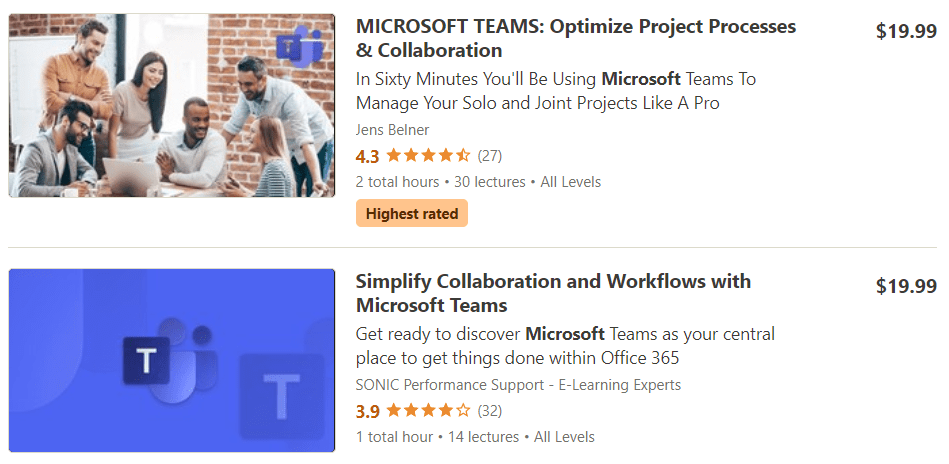5 Best Resources for Collaboration Training
Teamwork and collaboration training are fast becoming sought after resources for businesses that are trying to work across distributed workplaces.
Providing your team with the appropriate platforms and collaboration tools is a critical first step towards setting the stage for success, but what about the backend interactions that comprise the actual work people do?
I’ve selected the five best resources collaboration training available, and broken down their various offerings to help you find the support your teams need.
When is it time for collaboration training?
Whether you are trying to spur the work of a single team or trying to build a company-wide culture of collaboration, you want to give your teams the best chance of success. Investing time and money into collaboration training is one way to help promote the kind of teamwork you want to see.
There are times where the need for training is obvious, such as:
- When a company wants to promote collaboration
- When teams are working together for the first time
- When new members join a team
- When teams are using new collaboration tools
There are also times where the need for collaboration training is less apparent but no less necessary. When a veteran team encounters a new challenge, for example they may need to work together in unfamiliar ways. You can support those efforts with training that educates the team about:
- Collaboration skills to improve their daily process
- Technical skills to help them work better with the tools they use
- Macro-level collaboration concepts, such as conflict resolution, consensus building, compromise, and shared decision making.
Collaboration is about building relationships, and that is something people are constantly working on. As teams shift personnel, people have to relearn how to work with one another in a new context.
Support their growth proactively by making collaboration training available before a serious problem exposes the need.
As you consider the different resources below, be aware that some courses are free, and others come with a free trial. Take advantage in order to get a full sense of what each offers, and what will work best for your team.
Resource #1 Free collaboration training
One of the easiest ways to get your teams access to collaboration training can be found in the support services offered by the products you use.
G Suite, for example, has a dedicated training center where people can learn how to use every aspect of the product.
Or there’s the Microsoft 365 training resources, including walkthroughs, explanations, templates that can be very beneficial for teams looking to collaborate through the productivity suite.
These are free resources, and there may be more than enough information for people to learn the backend of how they are supposed to work together. These companies really want people to stick with their products, so their materials anticipate a lot of questions people have about how they are supposed to function.
If you want to make the most of these resources, don’t just send a link to a support page in a mass email. Especially if you are using a new collaboration tool, you’ll want to marshall these assets deliberately to serve the needs of your specific employees.
Comb through the product support and help for areas of the product that are related to the way you imagine your teams will collaborate. Then introduce and present this information in a way that will make sense to your employees. The writers of support materials aren’t doing this, so someone at your company has to begin the process of local translation.
If you don’t, individuals will translate the product to their needs in different ways, which can get in the way of working together. Obviously you want them to push the limits of their tools and find new uses, but it’s important to establish a consistent framework for collaboration on your platform that is generally understood.
This is a zero-spend resource, although it will require some legwork to put together a document that shares the training resources and contextualizes their use.
Resource #2 Lynda.com collaboration training
Pricing:
- Basic: $25/month
- Premium: $37.50/month
- Business: contact sales
Lynda.com is an online learning platform that’s run by LinkedIn. As you would expect, the courses are geared towards businesses, and you can find a number of collaboration training resources that are useful in today’s workplace.

One of the really nice parts about using Lynda is the scope of their educational content. With a basic membership, which is reasonably priced, you have access to a host of courses, learning paths, and educational materials. The premium subscription includes extra course material and files for study.
There are courses to help you and your teams get set up on virtually any product or service that is in wide use today. Additionally, there are conceptual courses that can help you improve in every aspect of running a business.
When it comes to collaboration training, Lynda has a range of beneficial offerings. I’ve divided their related content into two general groups. In the first, you’ll find courses focused on collaboration, teamwork, and critical soft skills:
- Icebreakers for teams meetings and groups
- Leading Virtual Meetings
- Working in Harmony as a Senior Team
- Empathy at Work
- Creating a Culture of Collaboration
- How to Network When You Don’t Like Networking
- Decoding Body Language
These resources can help you promote collaboration leadership within your teams and organization, helping teams tackle the most complex processes.
There are also some wonderful product-specific collaboration training options:
- Microsoft Teams: Successful Meetings and Events
- Team Collaboration in Microsoft 365
- Zoom: Leading Effective and Engaging Calls
- Monday Productivity Pointers
- Learning Webex Meetings
These types of courses (and there are a lot more available) can help your teams work together better by understanding the power of the tools they use. Such resources can also be used to get people using collaboration tools in a consistent way.
That’s just a small selection of the offerings on Lynda that can help facilitate teamwork, and with a monthly Lynda subscription, it’s all yours.
Resource #3 Udemy collaboration training
Pricing:
- Varies depending on the course
Udemy is a massive marketplace for education. There are more than 50,000 instructors offering 150,000 courses in 65 languages.

Similar to Lynda, Udemy offers content and certifications that can help your teams with the soft skills like collaboration leadership and emotional intelligence, as well as “hard skills” courses for the specific products and services your teams use to work together.
Unlike Lynda, however, Udemy courses are priced individually. While there are free courses on Udemy, there’s no subscription that opens all the content, so you have to be more deliberate about the resources you choose.
In terms of collaboration training, you can find several courses:
- Collaboration and Emotional Intelligence
- Mastering Collaboration: Work Together for the Best Results
- Manage Change Through Collaboration and Team Work
- Bounce Back From Failure & Turn Conflict into Collaboration
- Taking the Pain Out of Collaboration: Tips & Best Practices
- Become a Chief Collaboration Officer | Team, Partner and Win
- Get Big Things Done: Become a Standout Collaborator
Each course comes with on-demand video, downloadable resources and full lifetime access provided you keep your Udemy account in good standing.
You can also purchase courses to help your teams gain fluency in the tools they use to collaborate, such as:
- Microsoft Teams: Optimize Project Processes & Collaboration
- Simplify Collaboration and Workflows with Microsoft Teams
- Google Professional Collaboration Engineer
- Learn Airtable
- Life Planning and Getting Things Done with Notion
- Social Media Marketing 2020 – Growth Through Collaboration
Udemy instructors are posting new courses everyday. As the playing field changes, make sure that your teams are getting the support they need.
Resource #4 Coursera collaboration training
Pricing:
- Varies depending on the course
- Team subscription: $400 user/year
- Enterprise subscription: contact sales
Coursera works with educational organizations and universities to provide students with everything from courses on niche topics to professional certifications and college degrees.

The online learning platform has options for individuals, teams, and enterprise. With the team or enterprise subscription, you get access to nearly 4,000 courses that can help people master new skills and earn professional certifications in more than 100 subject areas.
The pricing on Coursera ranges quite a bit, but that is because they offer courses (4-6 weeks), specialized programs (4-6 months), and online degrees (1-3 years).
In terms of collaboration training, you can choose an individual course or a specialized program. These are in-depth and taught by reputable instructors associated with top-tier universities:
- High Performance Collaboration: Leadership, Teamwork, and Negotiation
- Organizational Leadership Specialization
These options only represent the collaboration-specific courses, but Coursera has a lot of other excellent learning resources for neighboring concerns, such as project management, entrepreneurship, and business strategy.
Resource #5 edX collaboration training
Pricing:
- Free to audit (except professional education courses)
- $50-$300 for certificates and graded assignments
Created by Harvard and Massachusetts Institute of Technology, edX is a massive online open course provider that has 32 million students worldwide. The goal is to make the best educational resources available to everyone.

With the exception of professional education courses, there is no cost to take a course on edX. If you want to earn a verified certificate or have your assignments graded, however, there is a fee, which can range from $50-$300.
edX has big plans for lowering the barriers between people and quality education, and they are constantly adding new courses. In terms of collaboration training, they have two excellent options that can help you learn how to boost employee satisfaction and productivity through better workplace practices:
Teamwork & Collaboration is free to audit ($49 with certificate), and covers a broad range of useful topics, including: building, leading, organizing, and motivating teams, managing conflicts, working with cross-functional teams, and interpersonal relationship dynamics in small groups.
The Science of Happiness at Work is a professional certificate ($537) that you earn over three months. You will learn the research-based benefits of happiness at work and concrete strategies for boosting it in the workplace.
Collaboration training is always ongoing
There’s no recipe for collaboration that works in every setting. Once you find a process framework that works, enjoy the benefits but don’t forget to reassess how things are going.
The tools and platforms used to collaborate are constantly being updated, and keeping collaboration training current will help your teams make sure they are using all of the function you pay for.
The ways we work are also continually disrupted by events in the market and advances in technology. What worked last year may be untenable this year. Making it a point to invest in collaboration training is an easy way to make sure your teams are building workplace practices and behaviors that encourage teamwork and collective resilience in the face of change.

